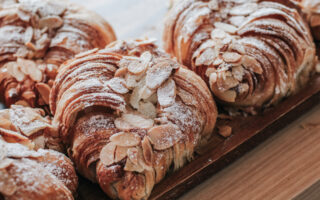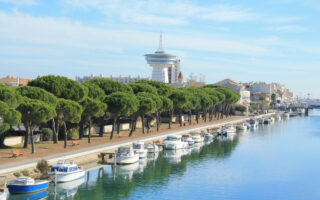Celebrating Easter Or Paques Like a Local in France
Feature


Easter is one of the most important dates in the Christian calendar and, naturally, is of great significance in France. With each year that slips by, we see a slightly more commercial approach to Easter. However, this celebration still maintains its strong traditions, and it is slightly different to the UK. There are certainly no Easter eggs on supermarket shelves in January here!
Of course, Easter is a moment of religious reflection as it is the time when Christians celebrate Jesus’ resurrection after his crucifixion on Good Friday, as well as the end of Lent. A sign of new beginnings, new life, and new hope. With France’s Catholic traditions, this remains an important celebration and religious festival.
As it is Springtime, the grass is greener, the bulbs are pushing through, and the children are on holiday. Easter is a family time in France, and many people do take a holiday (Easter Monday, le lundi de Pâques, is also a jour férié in France)
Towns and cities will decorate shop windows and town centres in traditional citrus and pastel colours. Markets and brocantes are commonplace. A famous Easter market is in Colmar where the town is beautifully decorated. Our own town of Aigre sees shopkeepers decorating windows and an annual Spring brocante which fills the whole town, attracting people from miles around.
The word for Easter in French is “Paques” which comes from the Latin, “Pascha” meaning Passover.
Easter in France
The word for Easter in French is “Paques” which comes from the Latin, “Pascha” meaning Passover.
Easter Monday, le lundi de Pâques, is a public holiday or jour férié in France, and so pretty much everything will be closed except, although your local bakery will probably be open! Good Friday is normally a working day except in parts of Alsace, and the French government ensures the school holidays coincide with Easter so all children will be off school to celebrate.

Easter Traditions in France
A major tradition in France is the Easter bells, dating from the 7th century. Our children came home from school one day, very confused and full of questions regarding the Easter bunny and Easter bells. Instead of the Easter bunny bringing the Easter eggs, children in France are told it is the Easter bells. “Les cloches volantes.”
The Church bells are silent from Good Friday as a sign of mourning for Jesus. The story goes that the bells then fly to Rome, and they carry with them the grief of all those who mourn Jesus. The Pope then blesses the bells in Rome and fills them with Easter eggs.
On Easter Sunday morning, the bells return from Rome and scatter the eggs all over gardens for the children to find, and the bells sound once more. In some villages, it is traditional for people to embrace and “faire les bises” (kiss) to celebrate.
In our house, we like to buy chocolate bells at Easter to remind us of this story, as when we first arrived in France, we were interested to know why so many chocolatiers had chocolate bells sitting alongside their eggs and hens. Now we know!
Easter eggs & egg hunts
The tradition of giving decorated eggs stems from the egg being a symbol of new life and birth. The Easter Bunny actually has Germanic and Nordic origins. It was said to be the emblem of the Goddess “Ost Ara” and eventually became ‘Easter’ in English and ‘Ostern’ in German. As such, it is thought to have originated as a traditional symbol of Easter in the Alsace region and then spread throughout France and beyond.
Given that the Easter bells leave eggs throughout gardens in France, it is no surprise that Egg hunts are popular here. Many local monuments (similar to National Trust properties) or communes will organise an egg hunt or Easter activities. Depending on where this takes place, the eggs may not be chocolate due to the risk to animals (most notably dogs). However, there will be plenty of chocolate on hand at the end as France is a nation of chocolate lovers.
Easter eggs in France vs the UK
Coming from the UK, where chocolate eggs are aplenty, and it can be hard work to squeeze your way down a supermarket aisle without knocking over an egg display (yes, it did once happen – much to my horror!), when we arrived in France and we saw the utterly exquisite handmade creations here, it was a shock. Chocolates in France are comparatively expensive to the prices we were used to paying in our home country, but the reality is, there is no comparison. Responsibly sourced chocolate, hand-tempered and real, quality crafted moulds with chocolate work all done by hand. You are paying for quality and expertise. These are works of art. And, oh my goodness, the taste!
It took our children a little while to become accustomed to the lower fat content of chocolate in France. They reported it tasted ‘different’. After five years here, they have no interest in their once-loved brands. Tastes have altered, and it is no surprise.
So, on Easter morning, our children wake to an Easter bell from our Nico, our local Chocolatier in Verdille, and our lovely neighbours often deliver a chocolate hen for them. Sometimes they may have some “fritures de Paques” which are little chocolate fish, again another Christian symbol.
Look out for chocolate workshops. Here in the Charente, we visit Letuffe, which was established in 1873. There is something very satisfying about making your own chocolate egg, and the children loved it.
Easter dining traditions in France
As with all celebrations in France, a meal is often planned with family and friends. Traditionally, lamb (agneau) is on the menu with a slow-cooked provencal style gigot d’agneau in the oven or a navarin d’agneau, which is a spring lamb stew.
Asparagus is just coming into season and is usually served as a starter or an egg dish due to its symbolism of new life and new, spring growth. In some parts of France, an Easter omelette is made too on Easter Monday.
Here in the Charente, we have two very traditional sweet treats which are only available at Easter time – the Cornuelle and the Rameaux.
A Cornuelle is a traditional Charentais shortbread-style biscuit originating from Villebois Lavalette. It is triangular in shape and said to represent the Holy Trinity. Our children love the Cornuelle dipped in chocolate.
Rameaux are not for the faint-hearted and are thought to originate from pagan times as a symbol of fertility. We always have a giggle, and we love to see the faces of our guests when they discover the delights of this cream-filled choux exclusive to the Charente.
Easter Vocabulary
Good Friday – Vendredi Saint
Maunday Thursday – Jeudi saint
Holy week – Semaine sainte
egg hunt – chasse aux œufs
Easter – Pâques
Easter Market – Marche de Pâques
Happy Easter! Joyeuses Pâques !
Throw yourself into the French Easter traditions and celebrate with flying bells, a family meal with local produce and some hand-made chocolates. Joyeuses fêtes!

Local Life in France
From shopping at the supermarket to sending a parcel at Post Office, finding your local dechetterie to who to call in an emergency—FrenchEntrée is here to help with every aspect of day-to-day living in France. Read our Essential Reading guides for advice on living in France, visit our Shopping zone or Pets zone, or brush up your language skills with our handy learning French resources.
Share to: Facebook Twitter LinkedIn Email
By Carol Paylor
Leave a reply
Your email address will not be published. Required fields are marked *






